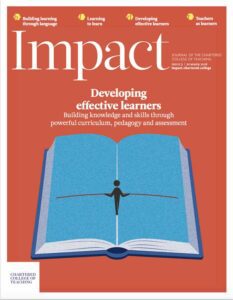Learning science and the teachable moment: The importance of the interactions between factors that affect learning

Learning science research aims to replace untested assumptions and intuitions about how people learn with empirically supported principles. However, many learning principles that work in the controlled context of the lab fail to translate directly to the classroom. They may not work in the classroom context or, more likely, they may work under some conditions but not in others; for example, Karpicke et al. (Karpicke et al., 2009) found that retrieval-based learning, which has strong empirical support from controlled studies with college students, was not effective for elementary school students tested in school settings. Because learning science generally studies only one or two factors in isolation, the emphasis is also on main effects or relatively simple interactions rather than complex interactions. For example, much research is based on the assumption that the primary goal of teaching is to have students learn and retain information for a long period of time, so it focuses on effective learning strategies for long-term recall (e.g. (Brown et al., 2014); (Dunlosky et al., 2013)). Other research might focus solely on metacognition (e.g. (Metcalf, 2009)) or attention (e.g. (Raviazza et al., 2012a)). While each of these factors is important, teachers must consider all of them simultaneously, as well as how each factor influences and is influenced by others (Nuthall, 2007).
Interactions, not main effects, are at the heart of teaching ((Chew et al., 2009); (Daniel and Poole, 2009)). This idea is reflected in the research literature, which is rife with interactions among student variables such as prior knowledge; the nature of learning materials; and the method of assessment (McDaniel and Butler, 2010). For example, Carpenter et al. (Carpenter et al., 2016) found that retrieval practice helped high-achieving students learn but, for low achievers, simply recopying the information was most helpful to them. McNamara et al. (McNamara et al., 1996) discovered that students with little prior knowledge gained greater understanding from texts with high coherence, but higher prior knowledge students benefited more from minimal text coherence. The interaction, however, changed depending on how understanding was assessed. Foss and Pirozzolo (Foss and Pirozzolo, 2017) found that frequent testing helped learning for high-difficulty items requiring recall but not for easier items needing only recognition.
In order for learning science to inform pedagogy, I contend that we must have a comprehensive framework of the factors that affect learning and how they interact with each other. For teachers, this framework would organise the research into teaching-relevant categories, and it would inform the design, implementation and assessment of teaching practice. Learning science would also benefit, because such a framework would illuminate critical research problems. Such a framework does not yet exist, but I offer an initial foundation for such a theoretical framework here. This framework currently focuses solely on cognitive factors, as they are foundational for learning. Ideally, this framework can be used to organise and direct research that will lead to its continued elaboration and breadth.
The framework is based on three assertions. Firstly, learning occurs within the brain of each individual student, thus the focus should be on the conditions in which an individual learns. Secondly, we do not yet know the exact conditions under which learning occurs, but we do know a lot about factors that help or hinder learning. Thirdly, learning is a contextual outcome of multiple, interacting factors.
Reviewing the learning science literature, teachers should address the following cognitive challenges to promote effective student learning:
1. Mental mindset: Mental mindset can broadly be defined as the attitudes, beliefs and expectations about learning and the whole academic context – for example, how students view their ability to learn through their own efforts influences their willingness to take on challenges and their perseverance (e.g. (Yaeger and Dweck, 2012)).
2. Metacognition and self-regulation: Students are not often good judges of their own level of learning, nor are they effective in managing their study behaviour to improve their understanding (e.g. (Pintrich, 2004)).
3. Fear and mistrust: Students who believe that their teachers want them to succeed and who trust that teachers have designed assignments that are worthwhile will work harder and persevere longer than students who see their teachers as either indifferent or trying to weed out weak students (e.g. (Cox, 2011); (Yaeger et al., 2013)).
4. Prior knowledge: The more that students know about a subject, the easier it is for them to learn more about that subject (Ambrose and Lovett, 2014).
5. Misconceptions: Misconceptions are common in psychology and remarkably resistant to correction (Taylor and Kowalski, 2014).
6. Ineffective learning strategies: Students often prefer the least-effective study strategies for longterm learning (e.g. (Dunlosky et al., 2013); (Karpicke et al., 2009)).
7. TransferThe processes of applying learning to new situations of learning: Students often fail to generalise learning beyond the immediate classroom context (e.g. (Day and Goldstone, 2012)).
8. Selective attention: Students overestimate their ability to learn while multitasking or in the presence of distractions (e.g. (Raviazza et al., 2012b)).
9. Constraints of mental effort and working memory: Students can concentrate on and consider only a limited amount of information (can Merrienboer and Sweller, 2005).
This list of factors makes it clear why effective teaching is so difficult. Any valid theory of student learning has to address all these issues, and must do so in a way that can guide teaching practice and research. For example, a teacher may try to help students by correcting their poor learning strategies, but if the problem is with misconceptions and prior knowledge, the approach will be unsuccessful. And these factors do not stand alone. They all interact with each other. For example, greater prior knowledge reduces the mental effort needed to learn, enables more effective learning strategies and increases the likelihood of transfer. The contextual nature of learning means that there is no single best way to teach across all situations. There will always be boundary conditions to the effectiveness of any pedagogy. Instead of judging whether a pedagogy is good or bad, research should focus on the conditions in which the pedagogy is effective and the learning that results. The effectiveness of a pedagogy should be judged on the range of situations in which a pedagogy is effective or its utility in working within specific, critical learning situations. Finally, it means that effective teachers cannot be versed in only one form of pedagogy, but must be skilled in a variety of pedagogies and be prepared to alter pedagogical approaches if one is not proving effective. Frequent assessment of learning is required.
The teacher must manipulate, manage or monitor all these factors for each student. But this list is still too broad to be of practical, in-class usage for teachers. In order to capture the cognitive challenge of teaching in a functional form, I believe it is useful to revisit a venerable concept in teaching, the teachable moment (Havighurst, 1953), and interpret it in terms of learning science research. The concept of a teachable moment is common in education, even though it lacks a precise, well-accepted definition. Learning science can help to specify the definition in greater detail. I define a teachable moment similarly to Havighurst (Havighurst, 1953), as the point when effective learning becomes possible for an individual student. Based on research, we can say that a teachable moment occurs when all of the conditions below are met. The cognitive challenges addressed by each facet of the teaching moment are in parentheses. A teachable moment occurs when students:
- become aware of a gap or error in their knowledge (metacognition)
- see the value of correcting it (mindset)
- have a trusted source of accurate information (student fear and mistrust)
- believe they can master new understanding given sufficient effort (mindset)
- have sufficient mental effort to attend to that source (selective attention, mental effort)
- have sufficient prior knowledge to comprehend information (prior knowledge)
- recognise when they have mastered the new understanding (metacognition)
- process new information for long-term recall (learning strategies)
- are primed to recall new information in appropriate situations and prefer it over prior beliefs (misconceptions, transfer).
The teacher’s responsibility is to create an environment that brings about teachable moments. That environment includes both the pedagogy designed by the teacher and how the students interact with it. Effective teaching brings about teachable moments for as many students as possible, but the actual moment may occur at different times and under different conditions for each student. Teaching skill involves knowing how to bring about teachable moments for a particular set of students, how to identify them when they occur and how to make the most of them. In this model, an effective teacher knows how to become the teacher that his or her students need at that particular time.










